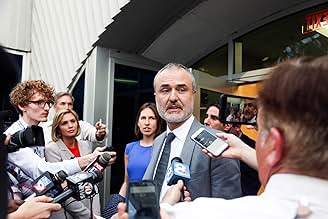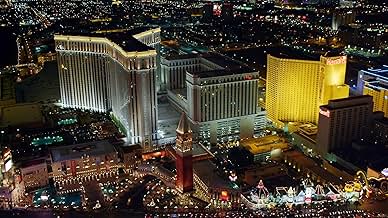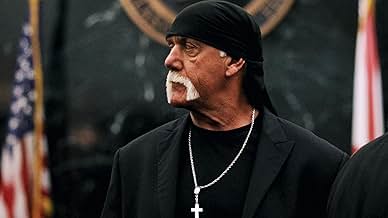IMDb RATING
6.4/10
4.5K
YOUR RATING
The courtroom and publicity battles between Hulk Hogan and Gawker Media explode in a sensational trial all about the limits of the First Amendment and the new no holds barred nature of celeb... Read allThe courtroom and publicity battles between Hulk Hogan and Gawker Media explode in a sensational trial all about the limits of the First Amendment and the new no holds barred nature of celebrity life in an internet dominated society.The courtroom and publicity battles between Hulk Hogan and Gawker Media explode in a sensational trial all about the limits of the First Amendment and the new no holds barred nature of celebrity life in an internet dominated society.
- Awards
- 4 nominations total
Emily Gould
- Self - Former Editor-in-Chief, Gawker.com
- (archive footage)
Pamela Campbell
- Self - Judge
- (archive footage)
Bubba the Love Sponge
- Self - Radio Host
- (archive footage)
- Director
- Writer
- All cast & crew
- Production, box office & more at IMDbPro
6.44.4K
1
2
3
4
5
6
7
8
9
10
Featured reviews
Problematic defense of the First Amendment
For the most part, this is an engaging documentary. But despite its marketing, "Nobody Speak" isn't really about the Bollea v. Gawker case. Sure, the trial gets plenty of screen time (in all its salacious and uncomfortable glory) but this is really about behind-the-scenes funding; the billionaire with a grudge against Gawker, the baron who buys out the Las Vegas newspaper to suppress unfavorable reporting. These are moneyed villains that beg to be reviled. Even His Trumpness is involved in a final segment that feels wholly supplemental) after waging a war on "Fake News".
The movie loses steam when it moves away from Peter Thiel and Gawker (its strongest segment) to broaden the support of the Fourth Estate. But on the whole, it's not bad.
6/10
The movie loses steam when it moves away from Peter Thiel and Gawker (its strongest segment) to broaden the support of the Fourth Estate. But on the whole, it's not bad.
6/10
If journalists don't pat their own back, who will?
This was a well-produced and thoughtful piece that certainly caught my eye as I scrolled through Netflix. As a guy who follows journalism fairly close (as a hobby, not an occupation), I was certainly intrigued.
There were three problems I saw with the movie.
First, it was very one-sided. Sheldon Adelson, a Republican, is obviously a horrible, maniacal billionaire whose only reason to purchase a newspaper is to hide any negative press about himself. Nevermind all the Democrat billionaires who buy newspapers-Buffett, Bezos, John Henry. I'm sure their intentions are 100% pure and noble and they never try to use their newspaper to cover up stories? Mmhmm. Sure.
Second, it was just an attack on one person. I'm not a Trump supporter. I did not vote for him and will never vote for him. But the disingenuousness behind the documentary was insulting. We can talk about the effect the Hogan/Bollea case has on journalism without having to go the anti-Trump route. (Also note, they say nothing about Obama trying journalists under the Espionage Act).
But the bigger point to all this is that journalists actually think they are above any criticism. ANY story they come up with is newsworthy, important, and completely above reproach. And to criticize them is to slap the face of the most important arm of civil society. To question them is to question the fabric of society-which is obviously the journalists.
We can't question them, call them to the carpet for shady, unethical, or inappropriate uses of their positions, stories, or actions. And since the general public's faith in journalism is waning (many will contend it's all but gone), they have to pat themselves on the back.
Nobody is going to bat for the journalists anymore. And perhaps that's the bigger element for them: they see their impact on society decreasing, so they need pieces like this.
I found this to be an intriguing, yet troubling film.
There were three problems I saw with the movie.
First, it was very one-sided. Sheldon Adelson, a Republican, is obviously a horrible, maniacal billionaire whose only reason to purchase a newspaper is to hide any negative press about himself. Nevermind all the Democrat billionaires who buy newspapers-Buffett, Bezos, John Henry. I'm sure their intentions are 100% pure and noble and they never try to use their newspaper to cover up stories? Mmhmm. Sure.
Second, it was just an attack on one person. I'm not a Trump supporter. I did not vote for him and will never vote for him. But the disingenuousness behind the documentary was insulting. We can talk about the effect the Hogan/Bollea case has on journalism without having to go the anti-Trump route. (Also note, they say nothing about Obama trying journalists under the Espionage Act).
But the bigger point to all this is that journalists actually think they are above any criticism. ANY story they come up with is newsworthy, important, and completely above reproach. And to criticize them is to slap the face of the most important arm of civil society. To question them is to question the fabric of society-which is obviously the journalists.
We can't question them, call them to the carpet for shady, unethical, or inappropriate uses of their positions, stories, or actions. And since the general public's faith in journalism is waning (many will contend it's all but gone), they have to pat themselves on the back.
Nobody is going to bat for the journalists anymore. And perhaps that's the bigger element for them: they see their impact on society decreasing, so they need pieces like this.
I found this to be an intriguing, yet troubling film.
Scumbag bully 'journalism' fails to justify or defend itself
This quite well presented 'documentary' makes no real attempt to address the facts and instead sets itself up with a number of straw man arguments it never delivers on.
For a start the film makes out that this is a story about the free press, the earnest, honest hardworking noble establishment working to uphold the high ideals of a great society.
In reality they're dealing with gossip journalism, muck shoveling drivel that at best distracts the population from looking at issues that really matter, like world peace, corporate corruption, racism social and gender injustice etc, and at worst pose a real and damaging effect on society and how we develop. It's almost laughable to watch these shills wince in interviews at saying the 'f' word yet their day job is to pedal and create as much pornographic like garbage and sensationalist atrocities as they can fit in an edition. They really are unintentionally self unaware and horrible low life.
Yes the concept of freedom of the press is an important pillar of the free world, but the concept is not there for the likes of these muck peddlers although it has until now protected their right to make sh!t up or profit from the misfortunes and ugliness of others. With that freedom comes responsibility and watching these people talk for almost 2 hours clearly demonstrates they have no interest or comprehension of what it takes to make a functioning safe and thriving society. They try to hang the discussion up on technicalities and loop holes pretending they're oblivious and innocent to the larger picture of what these particular individuals do and how they undermine the much more noble establishment of the 4th estate.
It would be funny if it didn't have real impact not only on the celebrities they attack but a serious real impact on the mindset of the world we live in. But that's just the people this film fails to paint in a favorable light.
As for the film itself, while its camera angles, sound and music are all professionally produced the producers fail to maintain any real 'documentary' credibility. They never address the harm that gawker style 'journalism' does to the individuals they focus on or to the public at large who are tricked into participating in a downward spiral of ugliness, as if it was irrelevant to the discussion.
This is a thoroughly unpleasant unsuccessful (at least to the producers goal of justifying gawker as some sort of moral high ground "what did we do wrong??" innocent victim of powerful men out to hurt them shtick) film.
What it unintentionally does is put the faces of the players in front of us and let them hang themselves with their own words, body language and expressions. We are without a doubt in a bad place as a society riddled with diversionary garbage news, and here are the people that bring it to you in all their self justifying, self-important, selfishness.
This is a truly horrible film in a way they didn't intend it to be.
For a start the film makes out that this is a story about the free press, the earnest, honest hardworking noble establishment working to uphold the high ideals of a great society.
In reality they're dealing with gossip journalism, muck shoveling drivel that at best distracts the population from looking at issues that really matter, like world peace, corporate corruption, racism social and gender injustice etc, and at worst pose a real and damaging effect on society and how we develop. It's almost laughable to watch these shills wince in interviews at saying the 'f' word yet their day job is to pedal and create as much pornographic like garbage and sensationalist atrocities as they can fit in an edition. They really are unintentionally self unaware and horrible low life.
Yes the concept of freedom of the press is an important pillar of the free world, but the concept is not there for the likes of these muck peddlers although it has until now protected their right to make sh!t up or profit from the misfortunes and ugliness of others. With that freedom comes responsibility and watching these people talk for almost 2 hours clearly demonstrates they have no interest or comprehension of what it takes to make a functioning safe and thriving society. They try to hang the discussion up on technicalities and loop holes pretending they're oblivious and innocent to the larger picture of what these particular individuals do and how they undermine the much more noble establishment of the 4th estate.
It would be funny if it didn't have real impact not only on the celebrities they attack but a serious real impact on the mindset of the world we live in. But that's just the people this film fails to paint in a favorable light.
As for the film itself, while its camera angles, sound and music are all professionally produced the producers fail to maintain any real 'documentary' credibility. They never address the harm that gawker style 'journalism' does to the individuals they focus on or to the public at large who are tricked into participating in a downward spiral of ugliness, as if it was irrelevant to the discussion.
This is a thoroughly unpleasant unsuccessful (at least to the producers goal of justifying gawker as some sort of moral high ground "what did we do wrong??" innocent victim of powerful men out to hurt them shtick) film.
What it unintentionally does is put the faces of the players in front of us and let them hang themselves with their own words, body language and expressions. We are without a doubt in a bad place as a society riddled with diversionary garbage news, and here are the people that bring it to you in all their self justifying, self-important, selfishness.
This is a truly horrible film in a way they didn't intend it to be.
Shoots itself in the foot
Completely one sided film. The film sets out to make case that the free press is being silenced with money (a very broad description, but you'll see there are multiple ways the press is being "silenced" by the wealthy), but fails at every turn to prove it, or to even to make journalists sympathetic characters.
Shot in foot #1: Claiming Gawker is a bastion of truth and had every right to share Hulk Hogans sex tape online.
There is, of course, the Peter Thiel aspect. Thiel is a multi-billionaire investor/entrepreneur who, along with friends, was outted as gay by Gawker media 10 years previous, and so funded Hulk Hogans lawsuit with Gawker over sharing his foray into amateur porn. Of course, most sane people don't like third-party litigation when it comes to two already-wealthy people... But in this case it's hard not to feel for the billionaire who came to the aid of his millionaire friend. Oddly enough.
Shot in foot #2 (and I'm going to hurry this along, as the movie does -- The story is really all about Hulk-Thiel): The Las Vegas Review is being bought by a mysterious company.... And the working journalists are concerned the buyer will silence them. They do some digging, expose the owner of the paper... and that's that. I also work at a corporate news outlet.... What's your point? I don't think there is one. Who but a rich man would own a newspaper? If anything this proves that those particular journalists were NOT silenced by their owner, at least in that instance....
Shot in foot #3: Trump fear mongering. We all know Trump disdains the free press. It's not his own original idea you know!
Some ominous words and a few famous quotes later, and it's finally over.
I laughed, I cried, and I learned nothing.
Such a noble idea -- The free press is being bought out and silenced. I'm sure it's true. But this movie fails to make the case.
Someone should take another shot at this subject.
A let down
With the attractive tailor, I was hoping this would be an enlightening documentary on how the press has stoped to function in our neo libertarian society but it turned out mostly like an advert for Gawker media and the people who hurt them, lightly and indirectly reminding us of the power of politicians and businesses to influence free press, while showing the people of the press in a good light. To be honest, the press itself is corrupt and this film stayed clear from that topic, how news and media are as interconnected to the businesses and political powers that run the show, and editors as as much to blame for misguiding the pawn citizen in this global game of the people in power to become wealthier and more powerful. If you really want to see something eye-opening, the whole nexus of lies we live in, go watch Requiem for an American Dream.
Did you know
- ConnectionsReferenced in Film Junk Podcast: Episode 619: Spider-Man: Homecoming (2017)
Details
- Runtime
- 1h 35m(95 min)
- Color
- Aspect ratio
- 1.85 : 1
Contribute to this page
Suggest an edit or add missing content


























